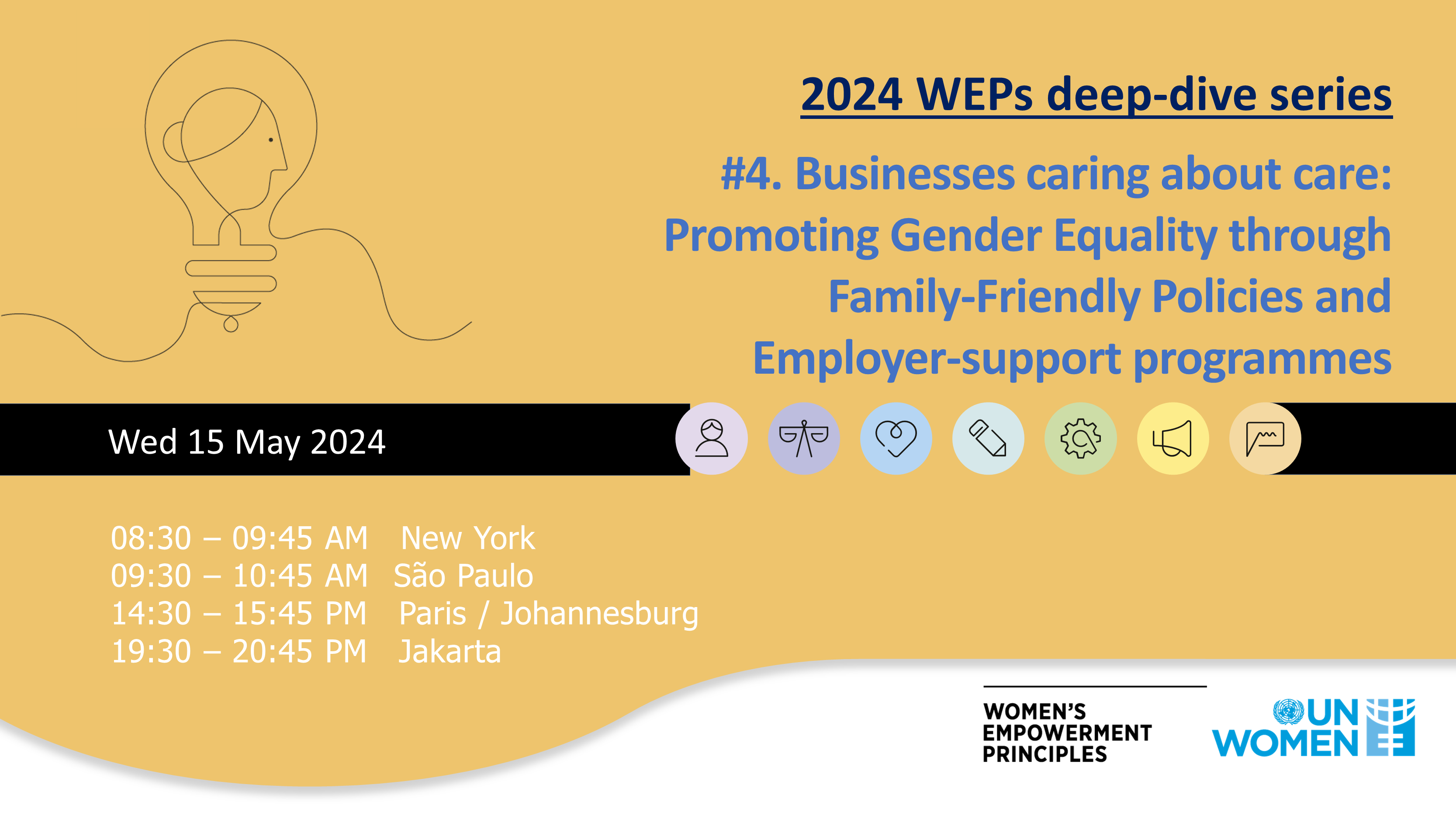Care work encompasses both direct, personal, and relational activities such as feeding a baby or caring for an ill partner, as well as indirect activities like cooking and cleaning. Despite its critical role in sustaining economies and societies, care work remains largely unrecognized, undervalued, and underpaid.
The private sector must prioritize support to their employees to manage their work and family responsibilities. The WEPs call for companies to implement care policies that enhance employee well-being and satisfaction. Such policies not only attract and retain talent but also foster a supportive and inclusive workplace environment.
For the fourth WEPs deep dive session, UN Women invited representatives from two WEPs signatories to discuss their care agendas. Anna Falth, WEPs Global Head, emphasized the essential nature of care for individuals, families, employers, and society at large. "Care needs to be at the core of corporate strategies and its value needs to be recognized," she stated, highlighting the importance of redistributing care responsibilities, which often fall disproportionately on women and girls.
Care Economy in Asia and the Pacific region
The UN Women Asia and the Pacific office works to recognize, reduce, and redistribute unpaid care work, make quality care accessible and affordable, and create better jobs for women.
Amy Baum, Women’s economic empowerment specialist consultant, outlined persistent challenges in the region. Women perform 4.1 times more unpaid care work than men, with 49% of women unable to seek employment due to caregiving responsibilities. Furthermore, 64% of women care workers in Asia and the Pacific are employed in the informal sector without any social protection. Care responsibilities also contribute to discrimination against women throughout their careers, including biases against women of reproductive age and perceptions that women are less career driven.
Transforming the care economy involves multiple stakeholders—households, the government, civil society and the private sector. Including unpaid care and domestic work in GDP measurements for Asia and the Pacific could add $3.8 trillion. UN Women's Asia-Pacific Care Accelerator supported 11 SMEs across the region to grow their businesses while developing gender-responsive business conduct aligned to the WEPs. Throughout the 10-month program, all 11 enterprises implemented gender goals to create safer and better working conditions for their employees and care workforce.
Innovative Care Solutions
Teenagers also require care, especially during long summer breaks. ICOP, a century-old family-owned Italian construction company, has prioritized family support through its “Work-Family Reconciliation Project”. This initiative includes a free day summer camp for employees’ children, helping parents balance work and family life. The camp fosters a supportive workplace culture and has been recognized for its successful and replicable format. Recently, ICOP adapted the camp to welcome young Ukrainian refugees, demonstrating its commitment to diversity and inclusion.
“Providing summer camps and care services can alleviate work-family balance challenges during extended school closures in Summer in Italy, benefiting employees and fostering a supportive workplace culture”, said Lucia Beltrame, member of the company’s social performance team.
Kiddocare, founded by Nadira Yusoff, is Malaysia's pioneering platform connecting parents with qualified childcare, elderly care, and special needs caregivers. Kiddocare’s tech-enabled model ensures that caregivers undergo rigorous training, including CPR certification, background checks, and health assessments. The platform caters to families and corporate clients through employee care benefits, and has raised $1.5 million in equity funding and generated nearly $9 million in revenue since its inception in 2019.
Kiddocare's impact-driven approach emphasizes caregiver professionalism and career progression. Utilizing technology, Kiddocare addresses industry inefficiencies by offering personalized, on-demand services.
What can companies do to support the care agenda?
Companies, regardless of size, can foster care by cultivating a gender-inclusive work culture and providing benefits tailored to employees' needs. For instance:
- Encourage men to take on caregiving responsibilities.
- Support families by removing stigma associated with care duties.
- Provide flexible working arrangements that consider employees' diverse lifestyles.
- Recognize that care extends beyond children to include the sick, elderly, and families at large
- Put in place and implement relevant policies.
By prioritizing care, companies can create a more supportive and inclusive workplace, benefiting both employees and the broader economy. What will your company do next?

